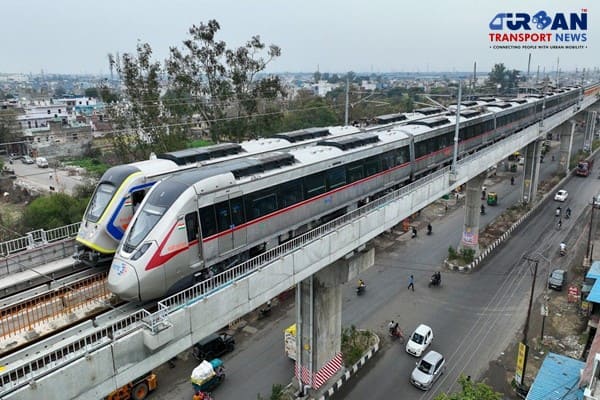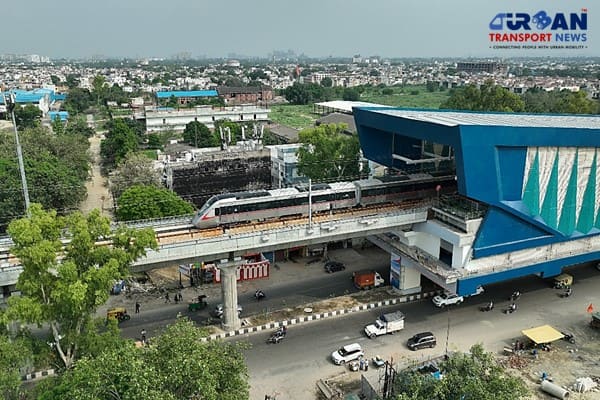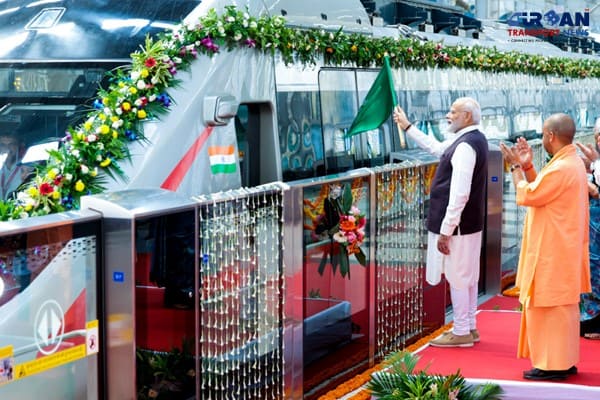 North-South Commuter Railway (NSCR): Modern Train Network Connecting Luzon Island
North-South Commuter Railway (NSCR): Modern Train Network Connecting Luzon Island India launched Bharat Taxi Service as First Cooperative-Owned Digital Mobility Platform
India launched Bharat Taxi Service as First Cooperative-Owned Digital Mobility Platform India places World’s First Live Commercial Order for Hyperloop-Based Cargo Logistics
India places World’s First Live Commercial Order for Hyperloop-Based Cargo Logistics How Weigh-in-Motion Systems Are Revolutionizing Freight Safety
How Weigh-in-Motion Systems Are Revolutionizing Freight Safety Women Powering India’s Electric Mobility Revolution
Women Powering India’s Electric Mobility Revolution Rail Chamber Launched to Strengthen India’s Global Railway Leadership
Rail Chamber Launched to Strengthen India’s Global Railway Leadership Wage and Hour Enforcement Under the Massachusetts Wage Act and Connecticut Labor Standards
Wage and Hour Enforcement Under the Massachusetts Wage Act and Connecticut Labor Standards MRT‑7: Manila’s Northern Metro Lifeline on the Horizon
MRT‑7: Manila’s Northern Metro Lifeline on the Horizon Delhi unveils ambitious Urban Mobility Vision: Luxury Metro Coaches, New Tunnels and Pod Taxi
Delhi unveils ambitious Urban Mobility Vision: Luxury Metro Coaches, New Tunnels and Pod Taxi Qatar approves Saudi Rail Link Agreement, Accelerating Gulf Railway Vision 2030
Qatar approves Saudi Rail Link Agreement, Accelerating Gulf Railway Vision 2030
IWD2025: Exclusive insights from Mrs. Namita Mehrotra, Director (Finance), NCRTC

In an exclusive interview, Mrs. Namita Mehrotra, Director (Finance) at the National Capital Region Transport Corporation (NCRTC), shares her journey in the infrastructure sector, shedding light on the critical role of Public-Private Partnerships (PPP) and the increasing participation of women in technical and leadership roles. She also discusses the impact of the Delhi-Meerut Rapid Rail Transit System (RRTS) corridor on sustainable development and economic growth.
Leading Financial Strategies in Infrastructure Development
Mrs. Mehrotra has played an instrumental role in shaping the financial strategies of the Delhi-Meerut Namo Bharat project. “At NCRTC, I have had the opportunity to contribute to a transformative urban mobility project that sets new benchmarks for public transport in India. Ensuring long-term financial sustainability is a key priority,” she explains.
From navigating the complexities of multi-lateral bank financing to assembling a high-caliber team, her journey has been marked by overcoming challenges. “Initially, establishing a new project financing structure posed significant hurdles. We dealt with three multilateral banks and had to create new rules and regulations. But building a financial framework from the ground up was an exciting challenge,” she recalls.
With a background in Delhi Metro’s first phase and extensive experience in infrastructure policy, PPP structuring, and finance, she has been at the forefront of financial innovation in urban mobility.
Breaking Barriers in a Male-Dominated Sector
The transportation and infrastructure sector has long been male-dominated, but Ms. Mehrotra’s leadership challenges that norm. “I have always believed that domain expertise, strategic thinking, and a results-driven approach are more important than gender. At NCRTC, equity is a hallmark of our functioning,” she says.
She highlights the increasing involvement of women in operational and leadership roles, particularly in the Namo Bharat project. “Young women are now taking on roles as train operators, engineers, and field experts. Seeing fresh graduates driving high-speed trains and leading engineering inspections is inspiring,” she notes.
While gender diversity initiatives are gaining momentum, she emphasizes the need for mentorship, leadership opportunities, and equal access to career growth.
Overcoming Challenges in Infrastructure Financing
Large-scale infrastructure projects come with a unique set of challenges. Ms. Mehrotra outlines the financial hurdles and innovative solutions that have shaped the Delhi-Meerut Namo Bharat project. “Ensuring financial sustainability is critical. We have focused on revenue generation through innovative contracting models, risk mitigation strategies, and transit-oriented development (TOD),” she explains.
Among the strategies adopted:
-
Value Capture Financing (VCF): Leveraging land value increases around transit corridors.
-
Public-Private Collaboration: Engaging private players for operations, rolling stock maintenance, and commercial activities.
-
Long-Term Efficiency Contracts: Partnering with Deutsche Bahn RRTS India for a 12-year operations and maintenance contract—the first of its kind in India.
“These strategies ensure financial health while reducing the burden on public resources,” she adds.
The Role of Public-Private Partnerships in Urban Transport
Public-Private Partnerships (PPPs) are key to modernizing India’s urban transport landscape. Ms. Mehrotra explains, “PPPs bring efficiency, innovation, and additional funding. Private sector involvement can range from full investment in construction and operations to outsourcing maintenance activities under structured contracts.”
Citing successful models, she highlights how Hyderabad and Pune Metro have leveraged PPP frameworks. NCRTC has also taken a pioneering approach by bundling 15-year maintenance contracts with rolling stock supply, ensuring long-term efficiency and cost optimization.
Women’s Evolving Role in Metro and Rail Sectors
The transportation sector is witnessing a shift towards greater gender inclusion. “Women are now actively involved in engineering, finance, operations, and policymaking,” she observes.
Namo Bharat integrates gender inclusivity at its core, featuring dedicated women’s coaches, CCTV surveillance, and well-lit stations with nursing rooms. Moreover, NCRTC has hired 88 women in operational roles, constituting 44% of the workforce. Initiatives like e-mobility training and vocational skill development for 500 women further support gender inclusion.
“Our industry must focus on providing leadership training, flexible work environments, and equal opportunities for career advancement,” she emphasizes.
The Future of Urban Mobility in India
As the Namo Bharat project expands to other cities, Ms. Mehrotra envisions a transformation in regional transportation. “The impact goes beyond mobility—it fosters sustainable and polycentric economic growth, job creation, urban planning, and reduced congestion,” she states.
With a robust funding strategy and integrated planning, the project has the potential to reshape regional mobility in India, offering faster access to healthcare, education, and employment while reducing carbon emissions.
Message to Young Professionals in Urban Infrastructure
Encouraging the next generation, Ms. Mehrotra shares, “Urban mobility’s future depends on innovation, inclusivity, and financial sustainability. Young professionals should explore opportunities in infrastructure financing, project development, and policy planning.”
As India moves towards an integrated and sustainable transport ecosystem, industry leaders like Ms. Mehrotra are paving the way for a new era in urban mobility—one that is inclusive, efficient, and future-ready.







